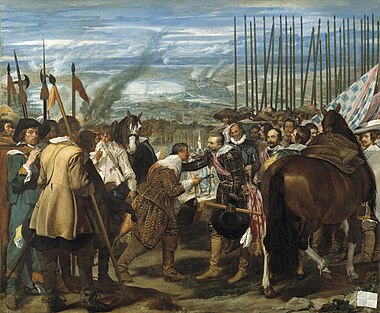Talk:The Surrender of Breda
| This article has not yet been rated on Wikipedia's content assessment scale. It is of interest to the following WikiProjects: | |||||||||||||||||||||||||||||||||||||||||||||||||
Please add the quality rating to the {{WikiProject banner shell}} template instead of this project banner. See WP:PIQA for details.
Please add the quality rating to the {{WikiProject banner shell}} template instead of this project banner. See WP:PIQA for details.
| |||||||||||||||||||||||||||||||||||||||||||||||||
Golden fleece
Text reads that the Gen who conquered Breda was rewarded with the Golden Fleece. I'm not particularly knowledgeable about Spanish military decorations, but the words link to the Greek mythological fleece. Does this check out? — Preceding unsigned comment added by Doubletriplereversepsychology (talk • contribs) 20:29, 17 September 2016 (UTC)
Physical dimensions
I understand that the painting itself is quite large and would have required a ladder to paint the upper portions. The height/width should be included. IMHO (talk) 05:19, 3 November 2008 (UTC)
Studies

I've just uploaded a couple studies done by Velázquez for this painting, File:Study 1 for La rendición de Breda, by Diego Velázquez.jpg and File:Study for Spínola in La rendición de Breda, by Diego Velázquez.jpg, shown right/left. Feel free to use if useful. Dcoetzee 01:54, 24 February 2010 (UTC)

File:Velazquez-The Surrender of Breda.jpg to appear as POTD soon
Hello! This is a note to let the editors of this article know that File:Velazquez-The Surrender of Breda.jpg will be appearing as picture of the day on June 5, 2018. You can view and edit the POTD blurb at Template:POTD/2018-06-05. If this article needs any attention or maintenance, it would be preferable if that could be done before its appearance on the Main Page. — Chris Woodrich (talk) 00:26, 18 May 2018 (UTC)
- All unassessed articles
- Start-Class visual arts articles
- WikiProject Visual arts articles
- Start-Class Spain articles
- Unknown-importance Spain articles
- All WikiProject Spain pages
- Start-Class military history articles
- Start-Class European military history articles
- European military history task force articles
- Start-Class Spanish military history articles
- Spanish military history task force articles





